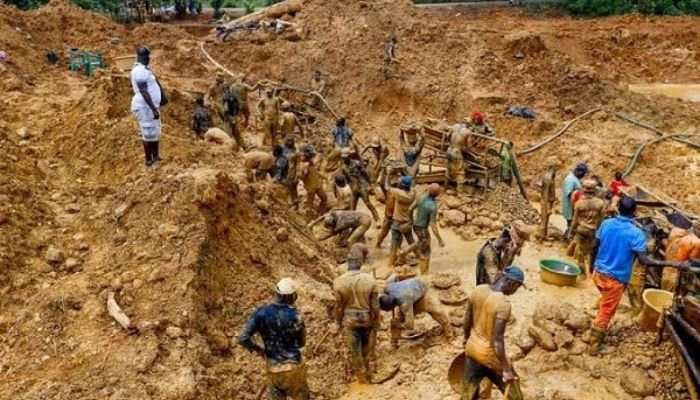Mining communities on the platform of the Federation of Nigerian Mining Host Communities and its Civil Society Partners have called on the National Assembly to adopt the inclusion of a 5% derivative for mining host communities, separate from the 13% allocation to the state to ensure equitable distribution of resources between the federal state and local communities.
The Federation which made the call while briefing Newsmen in Abuja yesterday, also alleged they were yet to see the benefits of the 13% derivative given to states, as not a single governor had ever accounted for it.
Habibu Wushishi, co-chair of the Federation in his remarks applauded the recent attempts by the National Assembly, particularly the efforts of the House Committee on Solid Minerals to amend the Minerals and Mining Act of 2007, to strengthen the legal and policy frameworks to ensure equitable distribution of benefits from the sector.
Wushishi in his recommendations called for “Derivative allocation for mining host communities, community development agreement reflecting environmental and social impact assessments, regulation of artisanal and small scale mining, separation of regulatory and administrative functions of the ministry of solid minerals development, security and welfare of host communities, the inclusion of Civil society organisations in state MIREMCOs as well as the chairmanship and acknowledgement of state autonomy in MIREMCO.”
In his words” We recommend the inclusion of provision of a 5% derivative for mining host communities, separate from the 13% allocation to the state, recognizing their integral role in mineral resources extraction and the need for equitable benefit sharing
He added that community development agreements (CDA) do not presently reflect environmental and social impact assessment or their recommendations, noting that Free prior informed consent must also be sought with the full import of the Environmental Impact Assessment (EIA) explained to the community before they agree on the terms.
“We commend the inclusion of specific provisions to regulate the artisanal and small-scale mining sector. More than 80% of solid mineral mining in Nigeria is artisanal. Effective regulation is essential in promoting responsible mining practices and safeguarding the environment and the rights of mining host communities, we therefore recommend the development of an artisanal mining regulation code in this regard” he added
Wushishi on behalf of the Federation of Nigerian Mining Host Communities and its Civil Society partners commended the efforts of the National Assembly to introduce legal reforms aimed at ensuring equitable governance of the solid minerals sector.
“We insist that the proposed amendments to the Act must better serve the interests of all stakeholders, particularly mining host communities, promote sustainable development in the mining sector and contribute to the socioeconomic advancement of our nation.” He said
Earlier Abiodun Baiyewu, executive director, Global Rights Nigeria stressed the need for the Federal government to empower the Federal Ministry of Solid Minerals Development, noting they were undermanned and underfunded.
Baiyewu recalled that even though the 13% mining derivative to states was approved quite a while back, states only began to receive it, adding that even with that, no state governor had been able to give an account of the derivative
She said” With the current effort of the ministry talking about the security challenges in host and other mining communities, their efforts would be inconsequential, if the ministry lacks the manpower or finance to tackle the many challenges observed in mining host communities. While the ministry sent them out to work, sometimes their duties are diverted due to poor or lack of funds”
She recalled that “Essential foundations had been laid in the constitution in section 14, B and C and Section 17, 2C that says that the primary essence of government is to ensure the welfare and security of citizens, noting that the rights of citizens that the exploitation of any resource in a community should be for the befit of the community.”
